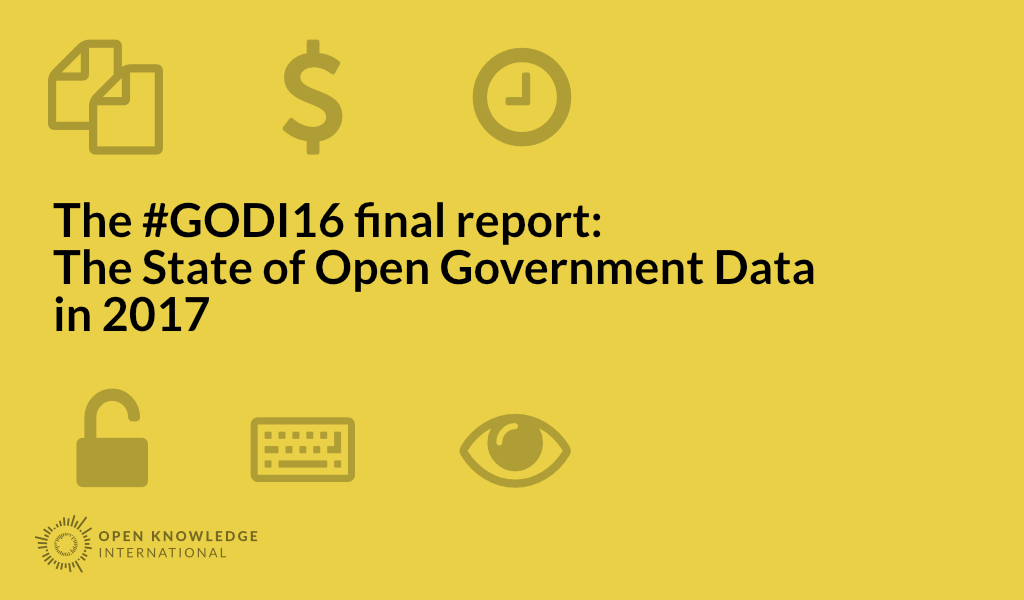In the last couple of months we have received questions regarding the status of the new Global Open Data Index (GODI) from a few members of our Network. This blogpost is to update everyone on the status of GODI and what comes next.
But first, some context: GODI is one of the biggest assessments of the state of open government data globally, alongside the Web Foundation’s Open Data Barometer. We notice persistent obstacles for open data year-by-year. High-income countries regularly secure top rankings, yet overall there is little to no development in many countries. As our latest State Of Open Government Data in 2017 report shows, data is often not made available publicly at all. If so, we see many issues around findability, quality, processability, and licensing. Individual countries are notable exceptions to the rule. The Open Data Barometer made similar observations in its latest report, mentioning a slow uptake of policy, as well as persistent data quality issues in countries that provide open data. So there is still a lot of work to be done.
To resolve issues like engagement with our community, we started to explore alternative paths for GODI. This includes a shift in focus from a mere measurement tool to a stronger conversational device between our user groups throughout the process. We understand that we need to speak to new audiences and focus on measurement as a tool in real world applications. We need to focus more on this. We want to understand the use cases of the Open Data Survey (the tool that powers GODI and the Open Data Census) in different contexts and with different goals. We have barely seen a few of the possible uses of the tool in the open data sphere and we want to see even more.
In order to learn more about how GODI is taken up by different user groups, we are also currently exploring GODI’s effects on open data policy and publication. We wish to understand more systematically how individual elements of the GODI interface (such as country ranking, dataset results, discuss forum entries) help mobilising support for open data among different user groups. Our goal is to understand how to improve our survey design and workflow so that they more directly support action around open data policy and publication. In addition we are developing a new vision for the Open Data Index to either measure open data on a regional and city-level or by topical areas. We will elaborate on this vision in a follow-up blogpost soon.
Taking this all into account, we have decided to focus on working on the aforementioned use cases and a regional Index during 2018. In the meantime, we will still work with our community to define a vision that will make GODI a sustainable measurement tool: we understand that tracking the changes in government data publication is crucial for the activists and governments themselves. We know that progress around open data is slower than we would like it to be, but therefore we need to ensure that discussions around open data do not end. Please do not hesitate to submit new discussions around country entries on our forum or reach out to us if you have any ideas on how to take GODI forwards and improve.
If you’re running an Open Data Census, we we’ll continue giving you support in the measurement you’re currently working on, whether it’s local, regional or you have any new idea of a Census you’d like to try. If you want to run your own Census, you can request it here, or send an email to index@okfn.org to see how we could collaborate further.
The official voice of the Open Knowledge Foundation.











Does focusing on use cases and a regional index in 2018 mean that there will not be a global GODI conducted this year? Which region is being considered and on what basis? How will the use cases be explored? Will this be structured research or skype chats with partners in country?
Thanks!
Hi Chris, following up on your questions, I’ll respond below to you.:
Does focusing on use cases and a regional index in 2018 means that there will not be a global GODI conducted this year?
This is correct, we won’t conduct a Global Index this year, but evaluate what is the best way to continue with this.
Which region is being considered and on what basis?
We aren’t completely defined on priority regions, it depends on a number of variables from available partners in the region, the definition of what we want to measure and funding available to work on this.
How will the use cases be explored?
We have identified a few from the community that has participated in GODI or used the Open Data Survey for other projects. We’ll publish more on that later.
Will this be structured research or skype chats with partners in country?
We will structure it so that we can get as much feedback as possible, with the least burnout as possible for the community. In the past, we have used written surveys since it gives participants time to think and respond at their own pace with the time frame that works.